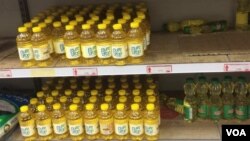The Oil Expressers Association of Zimbabwe (OEAZ), comprising seven members that supply at least 95 percent of edible oils consumed in Zimbabwe, says their operations have been crippled by shortages of foreign currency.
In a statement, OEAZ said members require at least US$5m per week (US$20m per month) to import soya beans, crude edible oils and other raw materials to satisfy national demand for oil and related products.
“For the 28 weeks ended 31 July 2017, OEAZ members have received US$61m which is US$2.2m per week (US$8.8m per month) which is 44% of what the sector requires to satisfy national demand. In the last two months foreign currency allocations have been further constrained to less than US$1.5m per week (i.e. 30% of the sector’s actual foreign currency allocation requirement), this is possibly linked to reduced tobacco sales inflows…”
The foreign currency allocation levels mean that OEAZ members’ credit lines for raw materials have now reached maximum levels and members can no longer access raw materials on credit from their foreign suppliers as they normally do.
“Reserve Bank of Zimbabwe (RBZ) has advised the OEAZ that foreign currency is in short supply but has assured the association of its commitment to support the sector based on available foreign currency resources.
“It should be noted that the shortages in certain outlets in urban centres can be averted by immediately increasing the amount allocated as foreign currency or the extending of RBZ supported Letters of Credit to OEAZ members to allow for the importation of adequate raw materials and other inputs. This is being worked on.”
The OEAZ also noted that input and raw material costs have escalated dramatically in the last few months leading to price changes as local suppliers and service providers in particular have adjusted their costs upwards in light of the prevailing economic environment.
It said the poor liquidity and scarcity of foreign currency has meant that fast-moving-consumer goods such as edible oils have become a substitute for cash as a store of value to the informal trade and fuelling higher demand and price inflation.
The OEAZ acknowledges that the long term solution is to increase soya bean production from the current 30,000mt for 2016/17 season to at least 150,000mt per annum in the next 3- 5 years and value chain reconstruction measures to achieve this through State Initiativesline the Command Soya and Presidential Input Scheme) as well as members themselves embarking on contract and direct farming initiatives supported by various financial institutions and agricultural organisations.
“In spite of constrained availability of foreign currency we have not had any notable shortage of edible oils for normal consumption in the last few years and the public is therefore advised not to engage in panic buying, hoarding and speculative purchases which create the impression of acute shortages and the risk of holding a perishable commodity such as edible oil as a store of value.”
The country requires 8,500mt of edible oils per month and 10,000mt of Soya Bean Meal used primarily for poultry feed.




